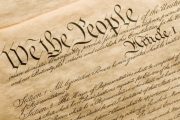Kansas Governor Sam Brownback (shown) isn’t backing down.
As we reported yesterday, U.S. Attorney General Eric Holder sent a letter to Brownback informing him that the Obama administration would ignore a new Kansas law nullifying federal gun control laws. Furthermore, Holder warned the governor that federal agents would “take all appropriate actions” to enforce federal gun control laws, calling the Kansas statute “unconstitutional.”
In a response to Holder’s letter sent on May 2, Brownback defends his state’s right to protect its citizens’ right to keep and bear arms as guaranteed by the Second Amendment.
“The right to keep and bear arms is a right that Kansans hold dear. It is a right enshrined not only in the Second Amendment to the United States Constitution, but also protected by the Kansas Bill of Rights,” Brownback writes. “The people of Kansas have repeatedly and overwhelmingly reaffirmed their commitment to protecting this fundamental right. The people of Kansas are likewise committed to defending the sovereignty of the State of Kansas as guaranteed in the Ninth and Tenth Amendments to the United States Constitution.”
The Ninth Amendment states, “The enumeration in the Constitution, of certain rights, shall not be construed to deny or disparage others retained by the people,” while the Tenth Amendment expressly reserves to the states and to the people all powers not specifically granted to the federal government in the Constitution.
The statute at issue — the Second Amendment Protection Act — was passed by the state legislature by an overwhelming majority and signed into law by the governor on April 16. Although the final version of the law was not as potent as originally drafted, it remains a laudable example of a state exercising its constitutional prerogative to resist — nullify — unconstitutional federal acts.
Nullification is a concept of constitutional law recognizing the right of each state to nullify, or invalidate, any federal measure that exceeds the few and defined powers allowed the federal government as enumerated in the Constitution.
Nullification exists as a right of the states because the sovereign states formed the union, and as creators of the compact, they hold ultimate authority as to the limits of the power of the central government to enact laws that are applicable to the states and the citizens thereof.
In the case of the Kansas law voiding all federal attempts to disarm citizens of the Sunflower State, the language explicitly reaffirms the right to keep and bear arms, but it goes farther by criminalizing participation with federal gun grabs.
Section 7 of the law declares:
It is unlawful for any official, agent or employee of the government of the United States, or employee of a corporation providing services to the government of the United States to enforce or attempt to enforce any act, law, treaty, order, rule or regulation of the government of the United States regarding a firearm, a firearm accessory, or ammunition that is manufactured commercially or privately and owned in the state of Kansas and that remains within the borders of Kansas. Violation of this section is a severity level 10 nonperson felony.
Even before Holder fired off his threat to Governor Brownback, state officials recognized that by taking on the Obama administration’s gun grab program they would be exposing themselves to legal challenges. They are ready.
In an interview with Fox News, Kansas Secretary of State Kris Kobach laid out his state’s position.
“We are very, very confident of our position,” Kobach said. “The state of Kansas is not in any way afraid of a legal challenge.”
There is little doubt that the president will bring the full brunt of the federal government to bear against Kansas and any other state courageous (and constitutionally aware) enough to resist federal tyranny.
In his letter to Brownback, AG Holder demonstrated his misunderstanding of key principles of federalism and the right of states to govern as protected by the Ninth and Tenth Amendments.
Holder denies that states have the right to interpose between citizens and federal acts. “Under the Supremacy Clause of the United States Constitution,” Holder writes, “Kansas may not prevent federal employees and officials from carrying out their official responsibilities.”
His comments echo a common misreading and misunderstanding of Article VI of the Constitution, the so-called Supremacy Clause.
Holder and others who follow this reasoning are wrong. The “Supremacy Clause” of Article VI does not endow all federal laws with supremacy over state laws in the same arena. The clause grants that special denomination to the Constitution “and laws of the United States made in pursuance thereof.”
That’s the phrase that pays: “In pursuance thereof.” Federal laws made in pursuance of the Constitution — not in violation of the Constitution — are afforded supremacy.
In fact, if an act of Congress exceeds the scope of the enumerated powers given to the federal government in the Constitution, that act was not made in pursuance of the Constitution and therefore it is not only not the supreme law of the land, but it is not law at all, but “merely [an act] of usurpation.”
Unlike the attorney general, Governor Brownback understands this basic principle of constitutional construction. While President Obama and Attorney General Holder believe that federal agents have the responsibility to carry out unconstitutional federal laws, Brownback recognizes that states have a higher responsibility, a responsibility to maintain order in the Union by enforcing the limits of power as set forth in the Constitution. James Madison explained in the Virginia Resolution of 1798 that any power residing in the federal government is derived:
from the compact, to which the states are parties; as limited by the plain sense and intention of the instrument constituting the compact; as no further valid that they are authorized by the grants enumerated in that compact; and that in case of a deliberate, palpable, and dangerous exercise of other powers, not granted by the said compact, the states who are parties thereto, have the right, and are in duty bound, to interpose for arresting the progress of the evil, and for maintaining within their respective limits, the authorities, rights and liberties appertaining to them.
Kansas and many of her sister states are trying to preserve liberty by opposing the threat to it posed by an out-of-control federal authority, bent on consolidating all power in Washington, D.C. Such a stance is not just the right of states, but is their obligation.
Governor Brownback closes his reply to the attorney general with an expression of hope that Holder will reconsider his position and appreciate the right and responsibility of Kansas to uphold the Constitution and the fundamental rights it protects.
“The people of Kansas have clearly expressed their sovereign will. It is my hope that upon further review, you will see their right to do so.”
Photo of Kansas Gov. Sam Brownback
Joe A. Wolverton, II, J.D. is a correspondent for The New American and travels frequently nationwide speaking on topics of nullification, the NDAA, and the surveillance state. He can be reached at [email protected]




